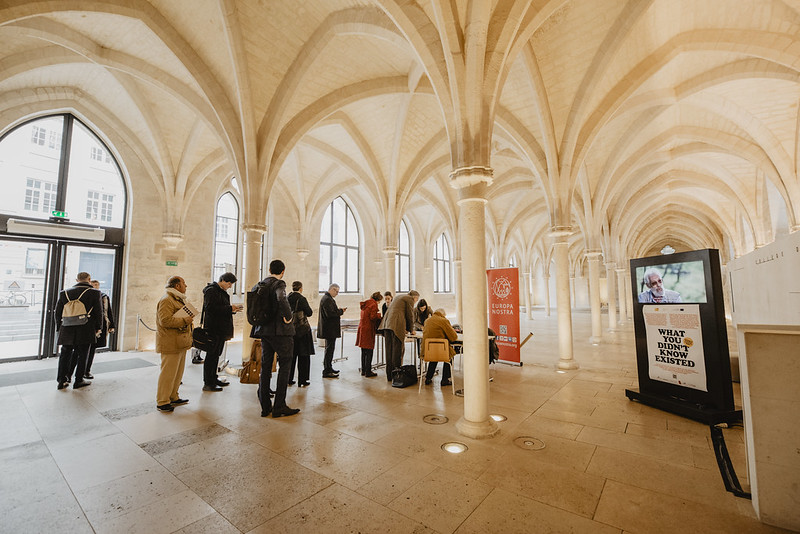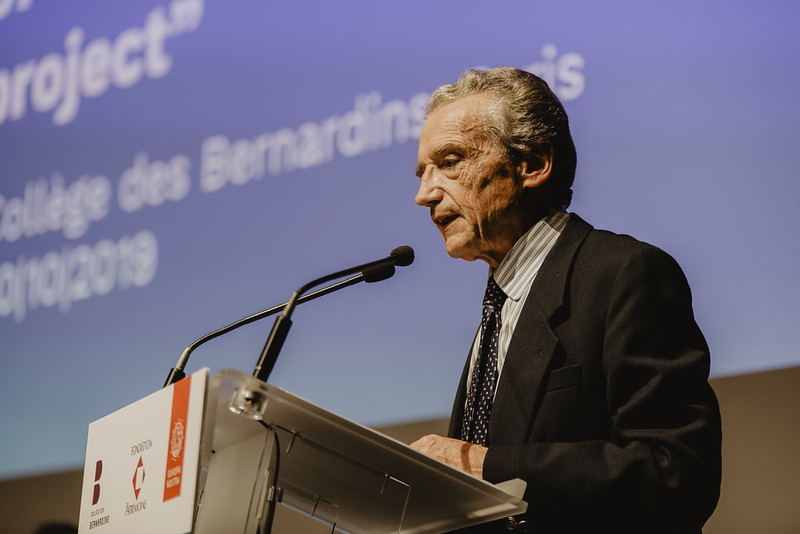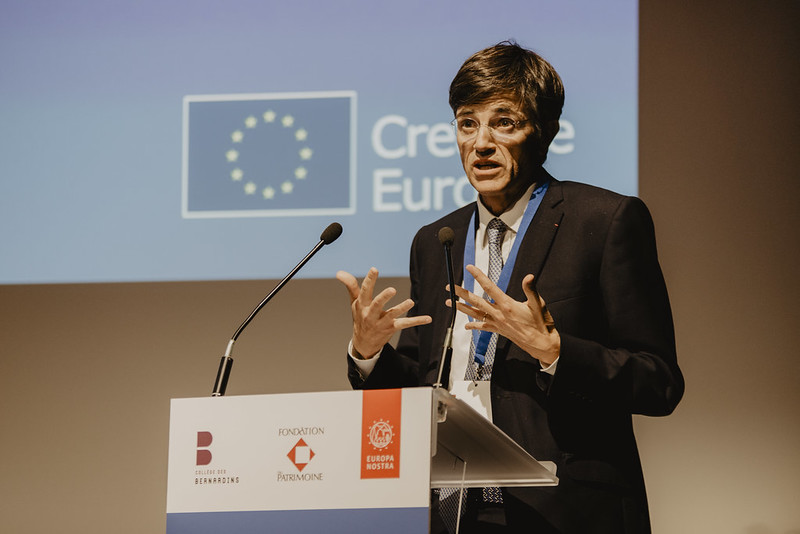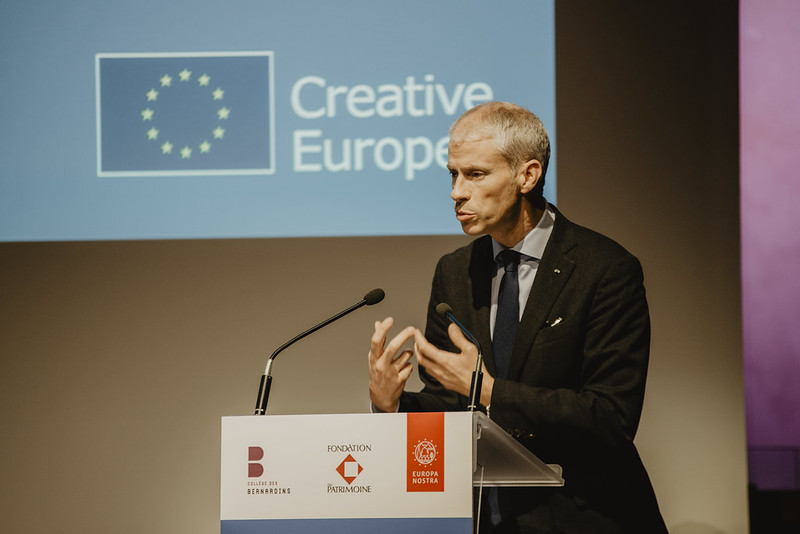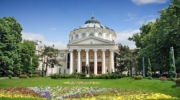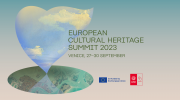Policy Debate: From the Berlin to the Paris Summit and beyond: Relancer l’Europe par la culture et le patrimoine culturel !
Closing Session ‘European Policy Debate – From the Berlin to the Paris Summit and beyond: Relancer l’Europe par la culture et le patrimoine culturel !’
One of the highlights of the European Cultural Heritage Summit 2019 in Paris was the European Policy Debate “Cultural Heritage at the Heart of the Revival of the European Project”, organised on October 30 as a co-production of Europa Nostra and the Collège des Bernardins and its research centre on Europe, in partnership with the Fondation du Patrimoine. For the five different sessions of the Policy Debate, participants gathered at the inspiring historic setting of the Collège des Bernardins, – just a few metres away from Notre-Dame Cathedral – to discuss some of the most pressing challenges which Europe and its citizens are facing, and reaffirm the significance of shared heritage assets for the future of the European project.
The closing session was entitled ‘From the Berlin to the Paris Summit and beyond: Relancer l’Europe par la culture et le patrimoine culturel !. The closing session took stock on
what has been achieved since the first-ever European Cultural Heritage Summit co-organised by Europa Nostra, the German Cultural Heritage Committee (DNK) and the Prussian Cultural Heritage Foundation (SPK) in Berlin on June 2018, focusing on how to maximise and upscale these accomplishments. But first and foremost, it brought to the fore what still remains to be done to ensure that culture and cultural heritage are placed where they belong: at the very heart of the European project. The aim of this session was to convey a strong and positive message on the importance of cultural heritage for the revival of Europe, and to make culture and cultural heritage a top priority for the next EU Institutions, and Member States, with the vital contribution of civil society and all stakeholders involved.
The debate was moderated by Bertrand de Feydeau, in his capacity as Vice-president of Europa Nostra, Vice-President of the Fondation du Patrimoine and President of the Fondation des Bernardins. He presented the draft text of the ‘Paris Manifesto: Relançons l’Europe par la culture et le patrimoine culturel !’, which encapsulates the key policy conclusion of the European Cultural Heritage Summit in Paris. ‘Last year, during the Berlin Summit, we launched the Berlin Call to Action “Cultural Heritage for the Future of Europe’. On this occasion, we want to launch a Manifesto. There is a semantic and substantive difference between these two. Manifestos are often used by the world of unions, they are more incisive. This Manifesto demonstrates our will to be incisive actors and to appeal the political world (…) on the importance that cultural heritage plays in the construction of Europe’, said Bertrand de Feydeau.
During the session, the invited speakers reacted to the Paris Manifesto from their very own perspective and the one of their respective organisations. Uwe Koch, Director of the German Cultural Heritage Committee (DNK) who was one of the co-hosts of the European Cultural Heritage Summit 2018 held in Berlin, recalled when he first launched the idea of the designation of a European Year of Cultural Heritage 2018 five years ago. For a long time, it remained only an idea, before becoming a reality and then a success. ‘Looking back – he said – we have moved mountains! Yesterday, I was very happy to hear the European Commissioner Tibor Navracsics say he is proud to have brought cultural heritage on top of the European Commission’s agenda. At the beginning, it was not sure that heritage could become a top priority for the Commission. But now it is.’ He referred to the motto ‘Sharing Heritage’, launched in Germany on the occasion of the European Year of Cultural Heritage and still being used, which reflects a paradigm shift, leaving behind the era of national supremacy and moving into the realm of interlinked shared histories. ‘The Paris Manifesto is a continuation of all this work that we have started 5 years ago, and is the next step to keep cultural heritage in motion’ he added.
François de Mazières, Mayor of Versailles, addressed the key role of cultural heritage for cities and its inhabitants, in terms of aesthetic value, social wellbeing and economic impact. He stressed the need for local authorities to use and promote cultural heritage as a vector for dynamism and development, and to give cultural heritage new impetus and life. He also highlighted education as a vital means to raise awareness of and promote a deeper understanding of cultural heritage among Europe’s inhabitants.
János Ádám Karácsony, Member of the European Committee of the Regions, spoke on behalf of regional and local authorities in Europe. He addressed cultural heritage as both fragile and powerful; it needs protection and cultivation but it can also unleash a tremendous energy and solidarity among citizens. He welcomed the Paris Summit as a continuation of the European Year of Cultural Heritage in 2018, and of the first Heritage Summit celebrated in Berlin last year, instead of a one-off event. “We need to look beyond the preservation and protection of heritage and look at its potential to help us understand society’s dynamics and its constantly -changing nature” he said.
Jorge Chaminé, Founder and President of the Centre Européen de Musique in Bougival, recalled the important role of arts and artists, and in particular of music, in the creation of Europe and in the creation of a European consciousness. “Music is the European cultural identity par excellence – and its hybridity is the DNA of our history, of Europe”, he said. He quoted Ludwig van Beethoven’s words when creating the Ode to Joy symphony: “My friends – never again in this tone’. “We need to change the tone, and to do it so, we need to open our ears to the sound of music”, he added.
Lorena Aldana, Responsible for European Affairs at Europa Nostra, spoke on behalf of the new generation of heritage experts. She stressed the need to engage, connect and empower young heritage professionals through meaningful opportunities to participate in heritage policy-making, by fostering exchange of experiences through mobility and solidarity actions, as well as through training, networking and upskilling pathways, including through Erasmus +. She stressed the importance of intergenerational exchange between established and emerging heritage professionals, a process that should be two-way, mutually beneficial and done on an equal basis. “It is not really that much about passing on the torch, but rather about working hand by hand, across generations, to keep its flame alive,’ she said. Read full speech here.
Amélie de Montchalin, French Secretary of State for European Affairs and Franck Riester, French Minister of Culture, closed the European Policy Debate and the European Cultural Heritage Summit in Paris on a high note with their inspiring and engaging interventions on behalf of the French government. French Secretary of State Amélie de Montchalin reminded that preserving heritage is more than just preserving stones: “Preserving our heritage allows the European spirit to have a concrete footprint in the life and collective consciousness of citizens” she said. ‘Cultural heritage is an essential component of L’Europe du Concrete: it needs more than just words – it needs concrete political commitments, means, and projects.’ she added.
French Minister of Culture Franck Riester welcomed the Paris Manifesto as an important contribution that will “allow us in the coming weeks, months and years, to continue relaunching Europe through cultural heritage and keep the idea of Europe alive”
More information
Watch the full video of this session here.
Read more on the European Policy Debate here.
Consult the Programme booklet of the European Policy Debate (in English and French). The programme booklet only exists in electronic version. Every unprinted booklet helps the environment.
